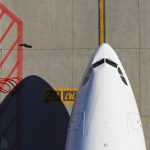Economic flash-point over Sines port development
A economic flash-point is developing between China and the US over the Portuguese port of Sines reports the Sunday Guardian.
The port near Setúbal, around 50 km south of Lisbon, is the closest port in mainland Europe to the US’s eastern shale basins, and has long been recognised by foreign powers for its geo-strategic importance as a deepwater port says the newspaper.
The Chinese have, in recent years, been actively investing in ports in Europe which it sees as fundamental for its One Road One Belt policy, Hong Kong-based Orient Overseas International Ltd (OOIL) was bought for US$6.3Bn by a Chinese state-owned shipping giant China Ocean Shipping Group (COSCO).
In the developing world it has a hand in Sri Lanka’s Hambantota and Pakistan’s Gwadar, while Beijing is investing in the development and operation of commercial ports worldwide, not just in Asia and Africa, but in Europe and the Americas.
COSCO started buying shares of Greece’s Piraeus port not far from Athens in the late 2000s, and by 2016, it held a majority stake. Chinese investments helped revive Greece’s major port terminal, making it the second largest in the Mediterranean after Valencia in 2018. COSCO Shipping also holds sizeable shares in other European terminals near Belgium’s Bruges, Italy’s Genoa, Spain’s Valencia, and the Netherlands’ Rotterdam. Elsewhere, outside of Europe, COSCO signed a deal in 2018 to invest US$2Bn to construct and operate a port on Peru’s Pacific coast.
Now Portugal has become part of the battlefield between the US and China with the US ambassador to Lisbon, George E. Glass echoing the US position on the intensifying rivalry between the two superpowers over Portugal back in September.
In an interview with Expresso published on 25 September, the US ambassador had threatened to change the US’s relationship with Portugal in security and defence with knock-on effects on its political relationship if Huawei entered Portugal’s 5G network or won the competitive tender to build the Sines container terminal.
A few years back, the chairman of Portuguese bank BPI, Fernando Ulrich, said that he was shocked that: “Portugal is being used as China’s aircraft carrier for Chinese investment into Europe.”
Says the Guardian, “Portugal launched an international tender in August this year for a contract to build and operate a new container terminal in Sines and will announce the results of the tender soon.”
“There is very strong US interest in Sines, where US firms want to expand the port’s liquid natural gas (LNG) terminal in order to increase gas exports to Europe, which they argue would also help reduce the EU’s energy dependence on Russia,” it adds.
China is bidding to build a huge US$770 million container port in Sines, a key project in its Belt & Road Initiative of which Portugal became a member in 2018.
At the time, President Xi Jinping borrowed an ancient Chinese saying to describe the bilateral relationship: “A partnership forged with the right approach defies geographical distance; it is thicker than glue, and stronger than metal or stone.” Portugal’s President Marcelo Rebelo de Sousa reciprocated with a state visit to Beijing in late April that also coincided with the 2nd Belt & Road Forum.
Whoever wins the tender, the consequences will be significant and there is some pressure on Portugal from China because it was one of the new countries that invested in Portugal during the financial crisis when Portugal had to go cap-in-hand to the IMF and ECB and was pressured by the European Commission to sell state-owned assets.
According to John Dobson, a former British diplomat, the problem isn’t just worrying the United States.
“The emerging consensus between EU members on China reflects a shared sense of economic imbalance, disappointment and unease. Member states are increasingly dissatisfied with China’s unwillingness to reciprocate the openness of the EU market. They also recognise that China is increasingly adept at dominating bilateral relationships with them, and it’s this aspect of Portugal’s relationship with China which has created considerable concern in Brussels.”
However, in Portugal, the minister for foreign affairs has made his country’s position crystal clear. While emphasising the strong economic and trade ties between Portugal and the US (Most important export market for Portugal outside the EU) and their shared membership of NATO, Augusto Santos Silva said in September that as a sovereign country, it would not bow to pressure for wherever it was exerted (not specifically mentioning the US).
He went on to tell the newspaper SOL that, “Portugal and China are friends and partners whilst not allies” and that defining international trade and cultivating a partnership does “not mean that we agree in every sphere.”
Another high-ranking official was less diplomatic, calling the US ambassador’s remarks in Expresso “unacceptable interference” while reminding that Portugal is the “only Western-European country with such a long, continuous and peaceful relationship with China.”
Infrastructure minister Pedro Nunes said in November that: “Portugal wants investors from the US, China and the rest of the world to invest in Sines and if the US wants to invest then we are open to that.”
But Ambassador Glass says that a Chinese container port would affect the US vision for the port’s development and said that China has “long-term plans for malign influence through economics, politics or other means.”
It is unlikely that the Portuguese government will announce who has won the tender until next year, and no doubt hopes that the incoming President Elect Joe Biden will lower the pressure and temperature in the argument.










